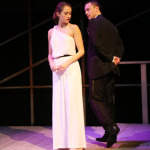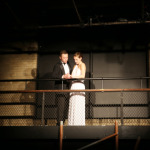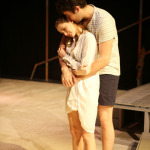A new production will explore a classic myth through music and talking stones.
“Eurydice” by Sarah Ruhl opens tomorrow night at the Whitney Theater. The play is based on the Greek myth of Orpheus and Eurydice, but looks at the story from Eurydice’s perspective as she journeys through the underworld. The production is a senior project of Lucie Ledbetter ’15, who plays Eurydice, and Leah Osterman ’15, who is directing the show. Ledbetter suggested that this change in the myth underscores the importance of Eurydice’s relationship with her father over her romance with Orpheus.
“In our production and in my interpretation of the character, the story is not about the tragedy of Orpheus and Eurydice not being united, but rather the triumph of Eurydice finding her independence and being reunited with her father,” Ledbetter said.
The storyline revolves around Eurydice’s marriage to Orpheus, her death and her subsequent journey to the underworld, where Orpheus attempts to save her. In Ruhl’s version of the myth, Eurydice encounters her father in the underworld. Ledbetter said she was drawn to “Eurydice” because of a playwriting class she took with Ruhl two years ago. Ledbetter noted that she believes several of the play’s themes are similar to the types of challenges that many college students go through, such as the process of becoming an adult and confronting the future.
Osterman said she and Ledbetter wanted the play to feel timeless and self-contained. According to producer Alison Mosier-Mills ’17, the costumes reflect this timelessness, as they do not correspond to a specific time period. This idea of “Eurydice” as a world without outside associations, Ledbetter added, allows the production to resonate with a broader audience.
Ledbetter said that one prominent feature of the show is the pool of water on stage — a technical feat that producer Alison Mosier-Mills ’17 said rarely occurs in Yale productions.
Set designer David Shatan-Pardo ’15 said the set incorporates water into all parts of the show. The stage, Shatan-Pardo said, will include a boardwalk and sewer pipes. He noted that the challenge in designing the set lay in Ruhl’s stage directions, which mandate that the stage itself should not change dramatically even as the play’s setting shifts from the land of the living to the land of the dead.
The network of sewer pipes from which water will also flow on stage is another feature that was made specifically for the production, Mosier-Mills said. Shatan-Pardo said that the pipes will serve as a visual contrast to the rest of the set, which will resemble a beach.
Ledbetter added that the production will also feature original music compositions of Gideon Broshy ’16. She explained that the continuous music and sound throughout the play are integral to the show’s design because Orpheus is a musician, while Eurydice fails to comprehend music, so the music embodies the tension within their relationship.
“We see the play as a symphony,” Ledbetter said. “Sarah Ruhl actually wrote it in three movements, so it’s structurally very musical, and we wanted to reflect that in the set design of the piece.”
Performances of “Eurydice” will run through Nov. 1.











